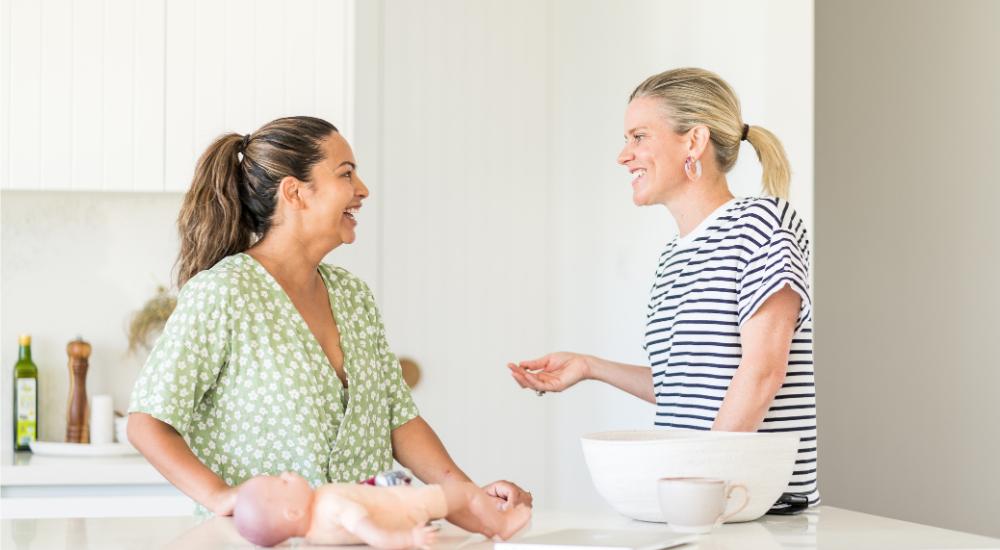Let’s talk about miscarriage
Whether you’ve experienced miscarriage personally, know someone who has or are newly pregnant, miscarriage is a possibility that has likely crossed your mind. While it is certainly not something that I would want to make you fearful about, the truth is many women are concerned about miscarriage or are working through the grief, trauma and confusion miscarriage can bring.
What did I do wrong? What could I have done differently? Why is this happening to me?
These questions and so many more are completely normal and common.
People are talking more openly about miscarriage, which is a great thing, but there is still a long way to go in bringing awareness to just how difficult it can be for women and their families; especially as up to 1 in 4 confirmed pregnancies end in miscarriage. There are estimates that there are even more who miscarry without even knowing they were pregnant.
I want to preface this post by saying that I’ve not experienced miscarriage, so I can’t speak from personal experience about what it feels like. But I am passionate about bringing awareness to issues that effect women’s fertility as well as their emotional health and well being on the path to parenthood. It’s important to me that we talk about all aspects of pregnancy and that includes miscarriage.
In this post I want to share some useful and practical information about what miscarriage is, what causes it, pregnancy after miscarriage, where to go for help and support as well as sharing a few links to more personal stories and experiences. Most importantly, I want anyone reading this to know you’re not alone, your feelings are completely valid, your experience matters and there are people who want to help.
What is miscarriage?
Miscarriage is the loss of a baby before 20 weeks of pregnancy. After 20 weeks, a baby’s death is known as a stillbirth. An early miscarriage occurs during the first 12 weeks of pregnancy and is considered the most common. A late miscarriage occurs between 12-20 weeks.
There are a few different types of miscarriage:
Molar pregnancy
This is when a pregnancy fails to develop properly from the point of conception.
Ectopic pregnancy
This occurs when the embryo implants outside of the uterus, commonly in the fallopian tube, and as you might imagine they can be extremely painful and potentially dangerous. If you experience severe pain in your abdomen, vomiting, pain in the tip of one shoulder and/or vaginal bleeding these could be signs of an ectopic pregnancy and it’s important that you seek urgent medical attention.
Blighted ovum
This is when the ovum sac develops but there is no baby, sometimes it is referred to as an embryonic pregnancy. This can be detected during a scan and usually they happen when an embryo was conceived but did not develop so was reabsorbed in the uterus at a very early stage.
Incomplete miscarriage
This is when there has been bleeding and the cervix has opened but the tissue from the pregnancy hasn’t yet been passed. Usually this will resolve on its own but in some cases the tissue will need to be either surgically removed or medically assisted. Your doctor will be able to discuss options with you.
What causes miscarriage?
The key point to remember when it comes to miscarriage is that in most cases, there is nothing that you’ve done or haven’t done to cause it.
While it’s human nature to want to find a reason or to blame someone or something, there is often absolutely nothing you could have done to change the outcome. Things that do not cause miscarriages include; stress, exercise, working out or having sex.
Some of the more common causes of miscarriage include:
- The baby doesn’t develop properly due to a spontaneous (not inherited) chromosomal abnormality
- Severe infections that lead to high fevers, not common colds
- Physical problems with the womb or cervix
- Immune system and blood clotting problems
- Some medical conditions such as thyroid problems or diabetes
It’s also worth noting that there are some things you can do to help minimise your risk of miscarriage. On their own, these things may not directly cause miscarriage, but the evidence suggests that women who avoid these things can minimise their chances.
What you can do to minimise your chances:
- Avoid coming into contact with people who have serious, infectious diseases such as influenza. Keep it real though, you can’t always help it.
- Don’t drink alcohol.
- Minimise your caffeine intake so that you’re having no more than 500mg caffeine per day. It’s hard to know exactly how much is in each cup. It varies between brands and cafés but on average try and have no more than 2 cups of espresso per day. Interestingly, aversion to coffee is quite common in those early months of pregnancy so it seems nature often takes care of that concern in many cases anyway!
- Don’t smoke.
How do you know if you’re having a miscarriage and what to do?
The most common symptoms of miscarriage include:
- Vaginal bleeding like a heavy period, which may include blood clots
- Cramps, similar to or stronger than period pain
What to do
If you think you may be having a miscarriage go to your doctor or the local emergency department. Unfortunately, if it is a miscarriage there isn’t anything that can be done to save the baby. However, there are other causes of bleeding in pregnancy that may not be related to miscarriage. It’s important to get appropriate care in either situation so ensure you always seek medical advice.
Getting pregnant after a miscarriage
When you’re in the middle of a truly difficult time it can be hard to think past the present moment. After a miscarriage you may feel like you’ll never experience the joy of being pregnant or holding a baby in your arms.
Hopefully, in time, you’ll be able to take comfort from the fact that most women will go onto to have happy and healthy pregnancies after miscarriage. Even if you have experienced one miscarriage before, your chance of experiencing another stays the same – approximately 1 in 4. If you have more than three miscarriages, your doctor may suggest some testing to detect a cause.
It’s important to give yourself time to grieve what has happened before trying again. You may find it helpful to seek some professional support for you and your partner.
Many women also feel a sense of guilt about becoming pregnant again and feeling excited for this new baby – which is normal. Some women may also experience additional anxiety and fear around the health and well being of their baby in subsequent pregnancies.
Here is a useful guide on pregnancy after miscarriage if you’re looking for further information.
During a time of loss, sometimes the only thing you can hang on to is hope. I’ve found a few beautiful stories about falling pregnant and having a baby after loss. You can read them here and here. Each experience is deeply personal and different but hearing stories from other women and sharing yours can help you feel less alone in those moments of despair.
This post from Cup of Jo shares the stories of three different women and their experience of miscarriage. Here are some more stories that share different women’s experiences of miscarriage – highlighting just how varied each miscarriage journey can be. There is also this personal story from Jenna Kutcher, which shares her experience plus some things that nobody normally tells you about miscarriage.
If you’re needing support there are several organisations that provide additional resources, counselling and support services. This can be an extraordinarily tough time and you don’t have to cope alone. Here are some great places to start:
SANDS – Sands provides support, information and education to anyone affected by the death of baby before, during or shortly after birth.
The Pink Elephants Support Network – Pink Elephants is a charity created to support women through miscarriage, pregnancy loss and beyond.
Wherever you are on your pregnancy journey or path to parenthood, I hope you feel seen and supported. While I have not experienced it myself, I understand that when you’ve experienced pregnancy loss it can feel like every other woman you know is pregnant. If you’re feeling this way right now, I want you to know that it’s OK to feel however it is you feel. Anger, fear, sadness, confusion, lost – it’s all valid. I’m sorry for your loss.



